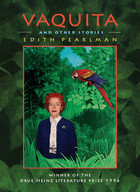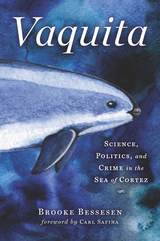2 books about Vaquita

Vaquita and Other Stories
Edith Pearlman
University of Pittsburgh Press
When asked to describe her short stories, Edith Pearlman replied that they are stories about people in peculiar circumstances aching to Do The Right Thing. She elaborated with the same wit and intimacy that make her stories a delight to read:
“Before I was a writer I was a reader; and reading remains a necessary activity, occupying several joyous hours of every day. I like novels, essays, and biographies; but most of all I like the short story: narrative at its most confiding.
“My own work, and particularly the stories in Vaquita, aims at a similar intimacy between writer and reader. My imagined reader wants to know who loves whom, who drinks what, and, mostly, who answers to what summons. Thank Heavens for Spike Lee! Before his movies writers and critics had to natter about moral stances; now I can say with a more tripping tongue that my characters are people in peculiar circumstances, aching to Do The Right Thing if only they can figure out what The Right Thing is. If not, they’ll at least Do Their Own Right Thing Right.
“And I’m drawn to heat: sweltering Central American cities; a steamy soup kitchen; Jerusalem in midsummer; the rekindled passion of an old historian; the steady fire of terminal pain. I like solitaires, oddities, charlatans, and children. My characters are secretive; in almost every story somebody harbors a hidden love, dread, regret, or the memory of an insult awaiting revenge.
“When I stop writing stories I plan to write letters, short and then shorter. My mother could put three sentences onto a postcard and make the recipient think he’d read a novel. I’m working towards a similar compression.”
“Before I was a writer I was a reader; and reading remains a necessary activity, occupying several joyous hours of every day. I like novels, essays, and biographies; but most of all I like the short story: narrative at its most confiding.
“My own work, and particularly the stories in Vaquita, aims at a similar intimacy between writer and reader. My imagined reader wants to know who loves whom, who drinks what, and, mostly, who answers to what summons. Thank Heavens for Spike Lee! Before his movies writers and critics had to natter about moral stances; now I can say with a more tripping tongue that my characters are people in peculiar circumstances, aching to Do The Right Thing if only they can figure out what The Right Thing is. If not, they’ll at least Do Their Own Right Thing Right.
“And I’m drawn to heat: sweltering Central American cities; a steamy soup kitchen; Jerusalem in midsummer; the rekindled passion of an old historian; the steady fire of terminal pain. I like solitaires, oddities, charlatans, and children. My characters are secretive; in almost every story somebody harbors a hidden love, dread, regret, or the memory of an insult awaiting revenge.
“When I stop writing stories I plan to write letters, short and then shorter. My mother could put three sentences onto a postcard and make the recipient think he’d read a novel. I’m working towards a similar compression.”
[more]

Vaquita
Science, Politics, and Crime in the Sea of Cortez
Brooke Bessesen
Island Press, 2018
"Intrepid conservation detective story." —Nature
"A lucid, informed, and gripping account...a must-read." —Science
"Passionate...a heartfelt and alarming tale." —Publishers Weekly
"Gripping...a well-told and moving tale of environmentalism and conservation." —Kirkus
"Compelling." —Library Journal
In 2006, vaquita, a diminutive porpoise making its home in the Upper Gulf of California, inherited the dubious title of world’s most endangered marine mammal. Nicknamed “panda of the sea” for their small size and beguiling facial markings, vaquitas have been in decline for decades, dying by the hundreds in gillnets intended for commercially valuable fish, as well as for an endangered fish called totoaba. When international crime cartels discovered a lucrative trade in the swim bladders of totoaba, illegal gillnetting went rampant, and now the lives of the few remaining vaquitas hang in the balance.
Author Brooke Bessesen takes us on a journey to Mexico’s Upper Gulf region to uncover the story. She interviewed townspeople, fishermen, scientists, and activists, teasing apart a complex story filled with villains and heroes, a story whose outcome is unclear. When diplomatic and political efforts to save the little porpoise failed, Bessesen followed a team of veterinary experts in a binational effort to capture the last remaining vaquitas and breed them in captivity—the best hope for their survival. In this fast-paced, soul-searing tale, she learned that there are no easy answers when extinction is profitable.
Whether the rescue attempt succeeds or fails, the world must ask itself hard questions. When vaquita and the totoaba are gone, the black market will turn to the next vulnerable species. What will we do then?
"A lucid, informed, and gripping account...a must-read." —Science
"Passionate...a heartfelt and alarming tale." —Publishers Weekly
"Gripping...a well-told and moving tale of environmentalism and conservation." —Kirkus
"Compelling." —Library Journal
In 2006, vaquita, a diminutive porpoise making its home in the Upper Gulf of California, inherited the dubious title of world’s most endangered marine mammal. Nicknamed “panda of the sea” for their small size and beguiling facial markings, vaquitas have been in decline for decades, dying by the hundreds in gillnets intended for commercially valuable fish, as well as for an endangered fish called totoaba. When international crime cartels discovered a lucrative trade in the swim bladders of totoaba, illegal gillnetting went rampant, and now the lives of the few remaining vaquitas hang in the balance.
Author Brooke Bessesen takes us on a journey to Mexico’s Upper Gulf region to uncover the story. She interviewed townspeople, fishermen, scientists, and activists, teasing apart a complex story filled with villains and heroes, a story whose outcome is unclear. When diplomatic and political efforts to save the little porpoise failed, Bessesen followed a team of veterinary experts in a binational effort to capture the last remaining vaquitas and breed them in captivity—the best hope for their survival. In this fast-paced, soul-searing tale, she learned that there are no easy answers when extinction is profitable.
Whether the rescue attempt succeeds or fails, the world must ask itself hard questions. When vaquita and the totoaba are gone, the black market will turn to the next vulnerable species. What will we do then?
[more]
READERS
Browse our collection.
PUBLISHERS
See BiblioVault's publisher services.
STUDENT SERVICES
Files for college accessibility offices.
UChicago Accessibility Resources
home | accessibility | search | about | contact us
BiblioVault ® 2001 - 2024
The University of Chicago Press









